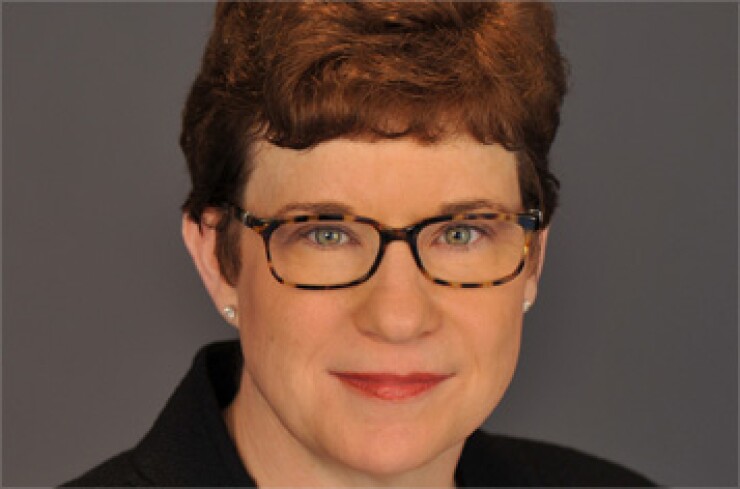
LOS ANGELES — Karol Denniston, an attorney known for her municipal restructuring work, has left Schiff Hardin to work in Squire Patton Boggs' San Francisco office.
Denniston, who started at her new firm Wednesday, joins as a partner in the public finance practice group.
"Karol is a great person and we are very happy to have her join us at Squire," said Harriet Welch, a partner in the Los Angeles office of Squire Patton Boggs, who was part of the team that brought Denniston to the firm.
Squire Patton Boggs is the creation of the June 1 merger that put together the larger Squire Sanders with Washington, DC.-based Patton Boggs, which was known for its public policy expertise.
The merger, official June 1, made the firm one of the 25 largest in the world with about 1,600 lawyers in 21 countries.
Squire Patton Boggs was the 10th largest bond counsel in the nation by volume in the first half of 2014, according to Thomson Reuters data.
What Denniston, who was a partner with Schiff Hardin, said appealed to her was that the platform at Squire Patton Boggs offers access to a very robust national municipal finance group. She will continue her practice in the municipal and high-yield space.
"I am very happy about the opportunity to work with Squire Patton Boggs' restructuring and government relations practice groups," Denniston said. "Restructuring in the municipal space requires deep public finance skills, including tax, broad restructuring experience and an appreciation of the government and political processes involved. I am thrilled to be on a platform that can provide clients access to these services."
The recent merger created synergy between different practices needed to provide clients with expertise in municipal restructurings, Denniston said. It did this by bringing attorneys with expertise in public finance, restructuring and government relations into the same firm, she said.
Denniston said she wasn't concerned about joining a firm that had so recently undergone a merger, because Squire "has a long history of successfully integrating with merger partners going back 15 years."
She also cited the opportunity to work for a law firm with depth on the bench in key practice areas needed to handle what could be a wave of municipal debt restructurings.
"I don't think there will be a slew of Chapter 9 bankruptcy filings, but I do think there will be a lot of restructuring opportunities from a transactional perspective," Denniston said. "There is a need for municipalities to look at refundings and other opportunities to access capital for liquidity in order to avoid default and deal with liquidity needs."
A lot of restructuring in mid-size cities will be transactionally oriented as opposed to Chapter 9 because municipal bankruptcies are hugely expensive, Denniston said.
The 30-year veteran cut her teeth on restructuring as an attorney during the savings and loan crisis in Texas in the 1990s. She has worked on capital markets and restructuring deals running the gamut from cross-border transactions and mergers and acquisitions to Chapter 7, 9, 11 and all the variations.
She moved into municipal restructuring in 2009. At that juncture, she played a key role in crafting Assembly Bill 506, the legislation that requires municipalities in California to participate in a neutral evaluation process before filing for bankruptcy.
Since then, she has represented clients in both the Stockton and Detroit bankruptcies.
The benefit in a government restructuring of having attorneys with government relations expertise is that those attorneys are familiar with the political process, Denniston said.
They can help modify local statutes or work to modify the bankruptcy code at the state and federal level, she said. Situations occurring in Detroit and Puerto Rico have both demonstrated a need for those skills, she said.
She pointed to discussions about the need for legislation to ensure that general obligation bonds are secured in the case of bankruptcy. Or, in Puerto Rico where the discussion has been about whether Congress will amend Chapter 9 so that agencies in Puerto Rico can avail themselves of municipal bankruptcy protection, she said.
"What makes this move good is that there hasn't been a connection between restructuring, public finance and government relations at one firm," she said.
Prior to the spate of municipal bankruptcies over the past several years, the space was small and quiet and didn't require an integrated approach.
She plans to continue to work in municipal restructuring serving capital markets clients, but with the ability to take on broader engagements.
Welch said she "encouraged Karol to join Squire because I could see that she is a leader in applying her skills in capital markets restructuring to matters involving municipal and nonprofit fiscal distress."
The firm plans to continue to seek out people for its public finance group.
"We are definitely growing and looking for those with the right skill set in California and nationally," Welch said. "We have added attorneys in the P3 area this year, as well as Karol, and, of course, our new public policy partners from legacy Patton Boggs."





